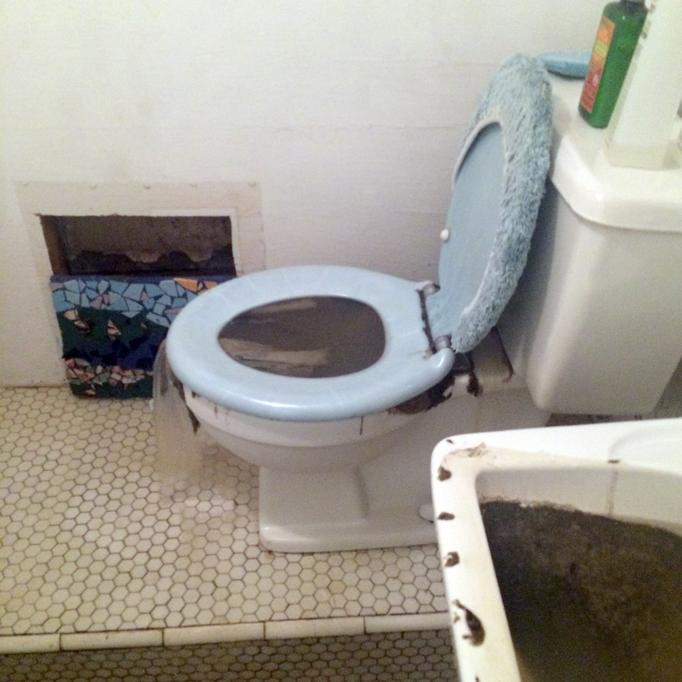Baltimore sewage backups: Where is the help?
For years, Ann Jubilee’s basement has flooded every time there’s a serious storm. Not from leaks. The 76-year-old retired state employee has replaced the sump pump and waterproofed. Not from blocked pipes. Plumbers have examined every inch. But seemingly because Baltimore’s faulty sewage system gets overwhelmed and drives wastewater into her home, bubbling up through a downstairs toilet. Twice just in the last six weeks, her family has had to remove 12 inches or more of standing brown water as they struggled to keep her home dry, clean and odor-free.
And each time, she has applied to the Baltimore Department of Public Works to help cover the costs of her mini-disasters. What has the DPW provided so far? Nothing, not a cent.
Advertisement[ The history of sewage backups in Baltimore, according to Clean Water Action. ]
“It’s been very frustrating,” says her son, Sean Stinnett, who lives four blocks away in West Arlington in the northwestern quadrant of the city. “It takes several days and perhaps a week to clean up the mess and sterilize everything. She’s lost hot water heaters, furnaces, pipes, washing machines and dryers and a lot of family memories and photos destroyed.”

This is not an uncommon experience. Last year, the city created a $2 million fund to reimburse city homeowners for as much as $2,500 to clean up sewage backups that take place when the city’s century-old system is overwhelmed by rain. The program was a reaction to DPW’s slow response to homeowner complaints — and low reimbursement rate. Yet a recent quarterly report filed by the agency under the terms of a federal consent decree notes that the city has approved just 14 percent of claims for the most recent reporting period, totaling a paltry $14,775.
AdvertisementOf course, it’s possible that many homeowners suffer sewage backups that aren’t eligible for reimbursement. They might, for example, have leaky basements and it’s just runoff from their own property. They might have clogged their own sewer lines by tossing baby wipes, or have trees in their backyard growing roots through them. They may even have failed to meet the strict parameters for reimbursement — the DPW is supposed to be notified within 24 hours. But many may be like Ms. Jubilee, who has gotten all such possibilities addressed by plumbers and only has letters of denial from the city to show for it.
Surely, the best approach would be for city officials to err on the side of caution. Ms. Jubilee has gotten help to cover her costs from her homeowner’s insurance, but she fears that her pattern of claims (given how often her basement has flooded) will soon get her policy dropped. She has had a parade of plumbers running cameras through her sewer pipes finding no problems. Meanwhile, her letters from the DPW allege that the agency has found no local obstructions on their side. Exactly who is correct and what is she supposed to do now?
When the city created the Expedited Reimbursement Pilot Program last year, it was to make it easier for homeowners to get their sewage backup costs covered. After all, the former reimbursement rate of 9% was considered outrageous. As a 2015 report from the Environmental Integrity Project pointed out, such overflows have been a particularly bad problem in West Arlington and nearby Grove Park. Are claims really getting expedited, or is it just denials that are getting processed faster? One has to wonder just how reliable the city has been in its evaluations, particularly given its long history of sewage woes, including the EPA consent decree that was supposed to have eliminated sewage overflows by 2016.
ACTION ALERT: Sewage doesn’t belong in our streets – or our homes. On Sept. 30, speak up to help improve Baltimore City's building backup reimbursement program. #Baltimore https://t.co/vO7mwcSt4C
— Blue Water Baltimore (@BlueWaterBmore) September 18, 2019Mr. Stinnett, who also serves as president of the West Arlington Community Association, says he and the rest of his family have grown tired of the basement flooding. Each time, they must lug in a shop vac, pull out the mops and then use bleach to keep things sanitized. It usually takes a week to set things right. Gone are the days when the basement could be used for any family activity. Many of their neighbors have had similar problems, yet they know of none who have been reimbursed for sewage overflows. Small wonder, given the 14 percent rate.
This Monday, the Maryland Department of the Environment is scheduled to hold a public hearing on the problem and the reimbursement program, beginning at 6 p.m. at 1800 Washington Blvd. We would urge frustrated homeowners to attend and make their concerns known. City residents deserve more help than they have received so far.








